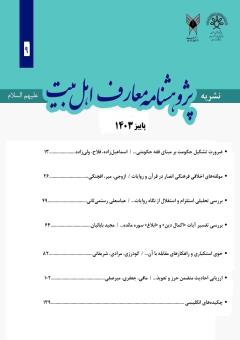بررسی تفسیر آیات «اکمال دین» و «ابلاغ» سوره مائده در تفسیر «بیان معانی در کلام ربّانی»
محورهای موضوعی : نشریه پژوهشنامه معارف اهل بیت علیه السلام
1 - دانش آموخته دکتری علوم قرآن و حدیث، واحد علوم و تحقیقات آذربایجان شرقی، دانشگاه آزاد اسلامی، تبریز، ایران.
کلید واژه:
چکیده مقاله :
مصطفی حسینی طباطبائی مؤلف تفسیر چهارده جلدی با نام «بیان معانی در کلام ربّانی» و از عناصر جریان شیعه¬نمای «قرآنیان»، در تفسیر آیه سوم مبارکه مائده معروف به آیه «اکمال دین» و آیه ی 67 این سوره، مشهور به آیه تبلیغ (ابلاغ)، با ردّ نظرات مفسّران شیعه مبنی بر دلالت این آیات بر امامت امام علی (ع) ، با ادعای اینکه بر اساس تفسیر قرآن به قرآن و سیاق آیات، این دو آیه ربطی به امامت امام علی ع ندارد، مدعی شده سوره مائده به یکباره نازل شده و آیه «اکمال دین» بر اساس روایاتی که سیوطی در کتاب خود آورده، نه در روز «غدیرخم»، بلکه در روز عرفات نازل شده است. بطور کلی او در تفسیر خود سعی نموده آیاتی که دلالت بر نصب الهی امامت را دارد، انکار نماید. در این پژوهش به روش توصیفی تحلیلی، اثبات شده با فرض اعتبار و اصالت سیاق و چینش توقیفی آیات قرآن، نه تنها این آیات در موضوع امامت با سیاق آیات همخوانی دارد بلکه ارتباط مستقیمی با «آیه¬ی ولایت» (57 مائده) دارند و روایات متعددی در حدّ تواتر در شأن نزول این آیات بر امامت امام علی (ع) دلالت دارد و بررسی روایات دیگر در کتب سیوطی نشان می¬دهد، سوره مائده به یکباره نازل نشده و قرائن متعددی مبنی بر نزول آیه «اکمال دین» در روز غدیرخم دلالت دارد.
Mustafa Hosseini Tabatabaie, the author of a fourteen-volume commentary Bayān Ma’ānī dar Kalām Rabbānī and one of the elements of the Shia trend of Qur'aniāns, in the commentary of the third verse ikmāl dīn, known as vers tablīgh by rejecting the opinions of Shia commentators that these verses imply the Imamate of Imam Ali (as) , claiming that based on the interpretation of the Qur'an by the Qur'an and the context of the verses, these two verses have nothing to do with the Imamate of Imam Ali (as). It is claimed that Surah Mā'īdah was revealed all at once and the verse Ikmāl Dīn was revealed not on the day of Ghadīr Khom, but on the day of ‘Arafah based on the narratives that Siyuti presented in his book. In general, in his tafsīr, he tried to deny the verses that indicate the divine installation of Imamate. In this research, using a descriptive- analytical method, proven by assuming the validity and authenticity of the context and the order of the Qur'anic verses, not only these verses are consistent with the context of the verses on the subject of Imamate, but they are also directly related to the verse vilāyah and several aḥādīth regarding the frequency of the revelation of these verses indicate the Imamate of Imam Ali (as), and the examination of other narratives in Siyuti's books shows that Surah Mā'īdah was not revealed at once.

